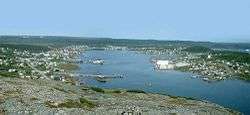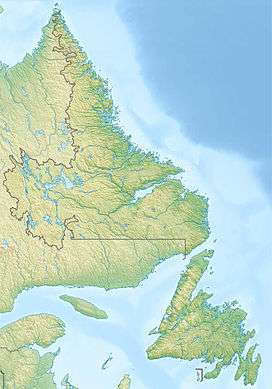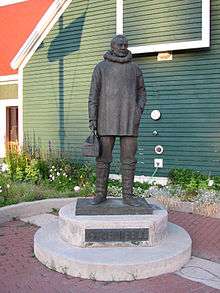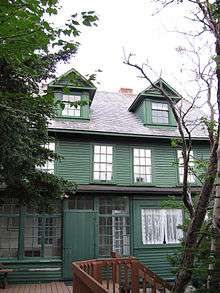St. Anthony, Newfoundland and Labrador
| St. Anthony | |||
|---|---|---|---|
| Town | |||
 | |||
| |||
 St. Anthony  St. Anthony Location of St. Anthony in Newfoundland | |||
| Coordinates: 51°22′21″N 55°35′41″W / 51.37250°N 55.59472°W | |||
| Country |
| ||
| Province |
| ||
| Settled | early 16th century | ||
| Government | |||
| • Town Mayor | Ernest Simms | ||
| Area | |||
| • Land | 37.02 km2 (14.29 sq mi) | ||
| Population (2011) | |||
| • Total | 2,418 | ||
| • Density | 65.3/km2 (169/sq mi) | ||
| Time zone | Newfoundland Time (UTC−03:30) | ||
| • Summer (DST) | Newfoundland Daylight (UTC−02:30) | ||
| Area code(s) | 709 | ||
| Website | St. Anthony official site | ||
St. Anthony is a town on the northern reaches of the Great Northern Peninsula of the Canadian province of Newfoundland and Labrador. St. Anthony serves as a main service centre for northern Newfoundland and southern Labrador. St. Anthony and surrounding area has an approximate population of 4,330.[1] The population of the town itself was 2,418 in 2011, compared with 2,476 in 2006 and 2,730 in 2001.
Demographics
According to the Canada 2011 Census:
- Population, 2011: 2,418
- Population, 2006: 2,476
- Population, 2001: 2,730
- Population, 1996: 2,996
- Population, 1991: 3,164
- 2006 to 2011 population change: -2.3%
- 2001 to 2006 population change: -9.3%
- 1996 to 2001 population change: -8.9%
- 1991 to 1996 population change: -5.3%
- Land (square kilometers): 37.02
- Median household income: $45,103
History
The history of European settlement of St. Anthony reaches back to the early 16th century, when French and Basque fishermen used the well-sheltered harbour as a seasonal fishing station. By the time explorer Jacques Cartier came across the settlement in 1534, he reported it was named St. Anthony Haven.
More people began arriving in the mid-19th century. By 1857, a census found 71 inhabitants in 10 families. By 1874, the population rose to 110, and by 1891, it was 139.
The town grew more rapidly after the arrival of Dr. Wilfred Grenfell in 1900 (see below).
A salt fish plant and cold storage facility built in the 1930s and 1940s were a boon to the local economy.
St. Anthony also became an outpost for the U.S. military. In 1951, a Pinetree Line radar site was built on a nearby hill, and by 1962, there were 250 servicemen stationed there. The site was operated by the 921st AC&W Squadron.
Tourism has become an important industry to the town as fishing stocks dwindled. Tourists come to visit historical sites related to Grenfell, to see the nearby Viking settlement at L'Anse aux Meadows or to see natural attractions such as icebergs and whales.
The Coat of Arms of St. Anthony is not from Letters Patent and therefore not legal.[2]
Dr. Wilfred Grenfell
St. Anthony's most influential historic figure is Dr. Wilfred Thomason Grenfell.
Born on February 28, 1865, in northern England. Grenfell entered the London Hospital Medical School in 1883. While in London, Grenfell heard the American evangelist Dwight L. Moody. The event inspired him to a life of Christian charity.
A member of the Royal National Mission To Deep Sea Fishermen, Grenfell was sent to investigate the conditions of fishermen in the Labrador region in 1892. He was said to be the first doctor to reach the region. He would later establish a string of hospitals, cooperatives and schools for people in remote Newfoundland and Labrador towns. He chose Red Bay as the headquarters of the Grenfell Mission in 1900. However, in later years the focus of the organization became St. Anthony. He began responsibility of health care for the more than thirty thousand residents in Northern Newfoundland and Southern Labrador. This health responsibility was maintained until 1981 when the Government bought the resources and took over responsibility for the health service for one dollar. Dr. Grenfell was most interested in the holistic approach to betterment of the lifestyle of the people of the province. He worked in areas of food production, craft production and sale. Grenfell also worked to provide funds for his religious mission through speaking tours throughout the United States and Europe and he used colorized slides of the people and places he was operating his mission. He began to work from a non denominational Christian belief structure and religious conversion was his goal. Although the religious based mission was successful he was supported by volunteers who gave service to the mission. One notable volunteer was Josephine Colgate of the Colgate fortune. Grenfell died in 1940 and his ashes were interred at Tea House Hill in St. Anthony with those of his wife Lady Anne Grenfell.
Climate
St. Anthony experiences a subarctic climate (Köppen climate classification Dfc) with long, cold winters and short, warm summers. However, owing to the strong maritime influence, the winters are less cold as most of Canada at the same latitude, and there is no permafrost especially with snow cover sometimes reaching as high as 276 centimetres (108.7 in).However its winters are still far more severe than Valentia Island off the coast of Ireland half a latitude farther north on the other side of the Atlantic which enjoys the moderating effects of the Gulf Stream. St. Anthony is as much as 11.4 °C (20.5 °F) colder than London on a near exact latitude in an average year. Precipitation, driven the powerful Icelandic Low, is quite high year round, with an annual average of approximately 1,300 millimetres (51.2 in).
| Climate data for St. Anthony (1981-2010) | |||||||||||||
|---|---|---|---|---|---|---|---|---|---|---|---|---|---|
| Month | Jan | Feb | Mar | Apr | May | Jun | Jul | Aug | Sep | Oct | Nov | Dec | Year |
| Record high humidex | 5.7 | 4.1 | 8.6 | 10.6 | 23.0 | 30.6 | 36.6 | 34.5 | 28.5 | 21.0 | 14.4 | 7.3 | 36.6 |
| Record high °C (°F) | 6.0 (42.8) |
6.7 (44.1) |
9.4 (48.9) |
14.1 (57.4) |
22.8 (73) |
27.4 (81.3) |
28.2 (82.8) |
30.0 (86) |
24.3 (75.7) |
20.0 (68) |
13.2 (55.8) |
8.3 (46.9) |
30.0 (86) |
| Average high °C (°F) | −7.5 (18.5) |
−8.0 (17.6) |
−3.7 (25.3) |
1.1 (34) |
6.4 (43.5) |
11.6 (52.9) |
16.5 (61.7) |
16.8 (62.2) |
12.7 (54.9) |
6.5 (43.7) |
1.0 (33.8) |
−3.8 (25.2) |
4.1 (39.4) |
| Daily mean °C (°F) | −11.8 (10.8) |
−12.1 (10.2) |
−7.4 (18.7) |
−1.9 (28.6) |
2.8 (37) |
7.1 (44.8) |
12.0 (53.6) |
12.6 (54.7) |
8.8 (47.8) |
3.5 (38.3) |
−1.9 (28.6) |
−7.5 (18.5) |
0.3 (32.5) |
| Average low °C (°F) | −16.1 (3) |
−16.2 (2.8) |
−11.1 (12) |
−4.9 (23.2) |
−0.8 (30.6) |
2.7 (36.9) |
7.4 (45.3) |
8.4 (47.1) |
4.9 (40.8) |
0.4 (32.7) |
−4.8 (23.4) |
−11.3 (11.7) |
−3.5 (25.7) |
| Record low °C (°F) | −32.8 (−27) |
−31.7 (−25.1) |
−31.6 (−24.9) |
−22.5 (−8.5) |
−11.7 (10.9) |
−3.1 (26.4) |
−2.0 (28.4) |
−0.3 (31.5) |
−2.5 (27.5) |
−10.7 (12.7) |
−17.5 (0.5) |
−30.6 (−23.1) |
−32.8 (−27) |
| Record low wind chill | −51.1 | −50.0 | −48.5 | −35.7 | −23.3 | −11.3 | −4.4 | 0.0 | −8.7 | −22.2 | −28.7 | −47.8 | −51.1 |
| Average precipitation mm (inches) | 113.9 (4.484) |
94.6 (3.724) |
98.0 (3.858) |
81.9 (3.224) |
82.7 (3.256) |
123.5 (4.862) |
106.3 (4.185) |
107.6 (4.236) |
119.8 (4.717) |
125.3 (4.933) |
115.7 (4.555) |
138.1 (5.437) |
1,307.3 (51.469) |
| Average rainfall mm (inches) | 7.6 (0.299) |
5.5 (0.217) |
17.8 (0.701) |
34.1 (1.343) |
64.4 (2.535) |
119.2 (4.693) |
106.3 (4.185) |
107.6 (4.236) |
119.6 (4.709) |
111.8 (4.402) |
65.3 (2.571) |
29.2 (1.15) |
788.3 (31.035) |
| Average snowfall cm (inches) | 115.1 (45.31) |
94.8 (37.32) |
84.3 (33.19) |
49.1 (19.33) |
18.9 (7.44) |
4.6 (1.81) |
0.0 (0) |
0.0 (0) |
0.2 (0.08) |
14.1 (5.55) |
51.4 (20.24) |
111.3 (43.82) |
543.7 (214.06) |
| Average precipitation days (≥ 0.2 mm) | 19.4 | 16.6 | 17.5 | 15.7 | 15.6 | 16.9 | 17.2 | 15.3 | 15.4 | 17.7 | 17.9 | 21.2 | 206.5 |
| Average rainy days (≥ 0.2 mm) | 2.2 | 2.1 | 4.7 | 8.0 | 11.8 | 16.5 | 17.2 | 15.3 | 15.4 | 15.6 | 9.2 | 4.9 | 122.9 |
| Average snowy days (≥ 0.2 cm) | 18.8 | 15.7 | 14.9 | 10.3 | 5.5 | 1.4 | 0.0 | 0.0 | 0.2 | 4.5 | 11.9 | 19.7 | 102.7 |
| Source: [3] | |||||||||||||
Attractions



- Is a popular tourist destination known for its whale watching.
Dr. Wilfred Grenfell's work in St. Anthony is commemorated by several historic sites and museums, including:
- Grenfell House Museum: Built between 1909 and 1910, it was the home of Dr. Grenfell, his wife Anne, and their three children. After Grenfell's retirement to Vermont, the house became a residence for mission workers. It opened as a museum in 1981.
- Grenfell Interpretation Centre: Interprets the life and times of Dr. Wilfred Grenfell through a gallery of interpretative paneling and displays. The centre is designed to be self touring and to provide a more modern interpretative experience for visitors. A rare medallic sculpture of Dr. Grenfell resides in the collection created by Christian Cardell Corbet.[4]
- Tea House Hill: A 20-minute walking trail with interpretative panels and seating along the route. The trail leads to the top of the hill where Dr. Grenfell, his wife and other colleagues' ashes are buried.
Other attractions include:
- The Rotunda: A display of ceramic murals depicting the culture and history of the people of Newfoundland and Labrador. The mural was created by the acclaimed sculptor Jordi Bonet.[5]
- Dockhouse Museum: which currently is not in operation, Demonstrated to visitors how vessels of all sizes were pulled out of the water for repairs in the late 1920s.
- L'Anse aux Meadows: A Norse village briefly inhabited around 1000 AD. The site was recognized as one of the world's major archaeological properties and is designated a UNESCO World Heritage Site in 1978.
See also
References
- ↑ "White Bay North Subregion". Northern Peninsula. Retrieved 24 February 2016.
- ↑ Hall, Rideau. "The Canadian Heraldic Authority". Government of Canada. Retrieved 22 June 2011.
- ↑ "Canadian Climate Normals 1981–2010" (CSV). Environment Canada. Retrieved 2016-05-09.
- ↑ Penney, Stephanie. "Gala raises funds for Grenfell". sculpture. Western Star. Retrieved 22 June 2011.
- ↑ Properties, Grenfell. "The Jordi Bonet Murals". Province of Newfoundland and Labrador. Retrieved 22 June 2011.
External links
Coordinates: 51°22′21″N 55°35′41″W / 51.37250°N 55.59472°W
